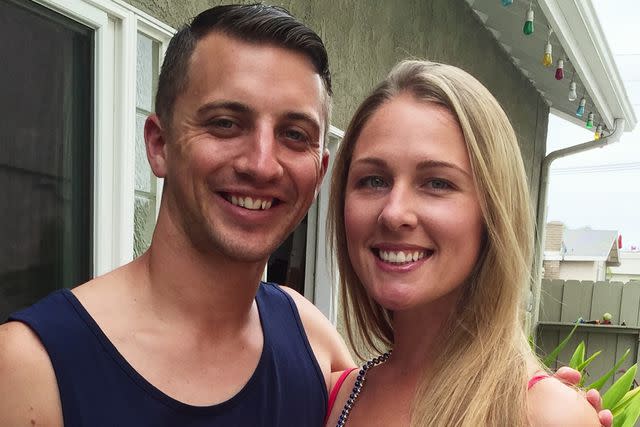“American Nightmare”’s Denise Huskins Says Watching “Gone Girl” After Her Own Kidnapping 'Released a Lot of Self-Blame'
Huskins, whose 2015 kidnapping is chronicled in Netflix's 'American Nightmare,' opened up about the case in Wednesday's episode of the 'Call Her Daddy' podcast

Courtesy of Netflix
Denise Huskins in 'American Nightmare.'Denise Huskins, whose 2015 kidnapping and sexual assault case is featured in American Nightmare, a Netflix true crime documentary series released earlier this year, is opening about her ongoing healing journey.
While appearing on Wednesday's episode of Alex Cooper’s Call Her Daddy podcast, Huskins shared how she responded to the harsh judgement that came her way after police in California initially falsely claimed her kidnapping was a hoax. Subsequently, police in Orange County dubbed the case the “Gone Girl kidnapping,” referencing the Gillian Flynn novel and hit Ben Affleck movie about a husband who becomes a prime suspect in his wife’s disappearance and presumed murder, and the nickname for the case stuck — even after the truth of the kidnapping was revealed.
“I mean, I'm hopeful that the true crime genre is changing and shifting and evolving,” she says. “Cause that's, you know, people had the wrong perception of how people behave in extreme situations. Yeah. And again, I can like get why people in the public might, you know, if their only experience is by watching something. But when law enforcement goes to fiction and uses that as a measure to judge people, that's where it's really terrifying.”
But Huskins — who has previously discussed the hurtfulness of the "Gone Girl" moniker with PEOPLE and the police’s botched response to the couple's calls for help — found that watching the film helped her to reflect on her experience in a new way.
Related: American Nightmare: Where Are Denise Huskins and Aaron Quinn Now After the 'Gone Girl Kidnapping'?
“I finally watched Gone Girl probably like nine months after the kidnapping,” she tells Cooper. “Like I couldn't face it. And when I watched it, I was like, it actually released a lot of that self-blame.”
Huskins adds, “Cause I was like, it didn't matter what, what I did. I mean, you're damned if you do, you're damned if you don't. Yeah. It didn't matter. Like [authorities] believed what they believed, and whatever I did or said was only going to fit that box. And so I was able to kind of release myself from it. Like this wasn't about me. Like that's not, it's not me. It's, it's their view of someone, of women, of whoever. But it's, it's not me."
In January, Huskins exclusively told PEOPLE how she felt about the continued use of the moniker.
“‘It's Denise Huskins' kidnapping,' [or] 'Vallejo kidnapping case.’ Name it what you want, give it a name, but it's not Gone Girl,” she said at the time. “That's what popped in the law enforcement's mind. That's a narrative that drove their thinking. And then that's what they relayed to the media.”
She added, “And then everything was shaped around that and seen in that lens,” she adds. “But if you take it step by step and look at it just objectively, it's nothing like Gone Girl.”
On March 23, 2015, Huskins and Quinn, both physical therapists, were suddenly awakened in the middle of the night by armed intruders who bound them with zip ties, blinded them with blackout swimming goggles, and drugged them. During the break-in, Huskins was kidnapped and Quinn later freed himself, soon calling police for help.

Courtesy of Netflix
Aaron Quinn and Denise Huskins.Quinn explained that Huskins had been held for two payments of $8,500, for a total of $17,000 in ransom. However, officers with the Vallejo, Calif., police department didn’t believe him. They would soon bring Quinn in for questioning based on their suspicion that Huskins was not kidnapped, but rather murdered by him.
Huskins was held captive for two days and raped twice by her kidnapper. She returned, appearing to be physically uninjured, outside her family’s home.
Shortly after, police publicly accused the couple of fabricating the entire incident as a hoax and condemned them, claiming they had wasted public resources and time on the investigation.
Three months after Huskins returned, Detective Misty Carausu of the Alameda County Sheriff’s Office led investigators to solve the case by tying evidence from a similar kidnapping at a home roughly 40 miles away from Vallejo. Authorities would eventually arrest Matthew Muller, a former Marine and disbarred Harvard-educated immigration attorney, who was linked to Huskins' kidnapping with evidence including videos of the rapes later found by the FBI.
Want to keep up with the latest crime coverage? Sign up for PEOPLE's free True Crime newsletter for breaking crime news, ongoing trial coverage and details of intriguing unsolved cases.
In September 2016, Muller pleaded guilty to one count of federal kidnapping, and was sentenced to 40 years in prison, where he remains today.
Quinn and Huskins reportedly settled with the city of Vallejo in 2018 for $2.5 million after suing three years earlier for false imprisonment, defamation, false arrest and intentional infliction of emotional distress.
The couple have since married, welcomed two daughters, and published a book in 2021 titled Victim F: From Crime Victims to Suspects to Survivors.
In a January interview, Quinn told PEOPLE the couple plans to advocate for individuals who have been wrongfully accused and hopefully become "part of the solution," by collaborating with law enforcement and sharing their story.
If you or someone you know has been sexually assaulted, please contact the National Sexual Assault Hotline at 1-800-656-HOPE (4673) or go to rainn.org.
For more People news, make sure to sign up for our newsletter!
Read the original article on People.


